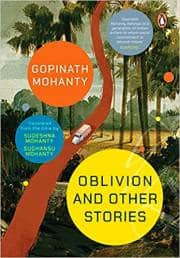
Oblivion and Other Stories an anthology of 20 short stories brings the writings of Gopinath Mohanty, considered a literary giant in the Odia (earlier Oriya) literary landscape. Translated by Sudeshna Mohanty and Sudhansu Mohanty, the anthology places social and personal anxieties as much as the political winds playing on the lives of people. The stories are situated in a certain time underlying the ethos of that period and so we have the uncertainties of what lies ahead juxtaposed with hope and dreams. There is a sense of weariness in a few of the stories, of how the human spirit is often caught under strain but there is no doubt that this anthology is quite the literary journey in the way it brings together the author’s works spanning six decades from the 1930s to the ’80s.
 'Oblivion and Other Stories', Gopinath Mohanty, Penguin Random House India, 288 pages, Rs 499.
'Oblivion and Other Stories', Gopinath Mohanty, Penguin Random House India, 288 pages, Rs 499.
For those who are not familiar with the works of Gopinath Mohanty yet, the anthology gives a glimpse of the expansive style of the author embellished with flashbacks where the protagonists ruminate over the past. As a writing style this would, perhaps, better suit longer narratives but in a short story, it makes the reader get a tad impatient and wonder just where things add up. The story Cricket starts with the sense of excitement around a match to be played between the Indian team and the visiting team from England in Cuttack and 70-year-old Kamaladevi wonders what the fuss is about before getting involved, but first, readers are taken through the state of her body and a brief sketch of her life as a wife and now old mother and grandmother. When the story culminates, it is on expected lines but there is something about the way the author brings in the ‘them’ and ‘us’ conflict that leaves one thinking.
The titular story Oblivion (written in 1941) is multilayered. It starts with a sense of wonder and pride over a new Orissa (now Odisha), manifested through a long, winding road that cuts through the lush jungles. There is development, connectivity and progress pitched against the primal backdrop of nature and both elements playing out on human lives. Sibaram Salura, our yet-to-be-married protagonist whose age the author does not let on is in a goods carrier and on his way to Vijaynagaram to report for his new job in the railways. There is hope, there is an entire gamut of possibilities lying ahead while Sibaram traces the highs of his shenanigans of his youthful dalliances. The author brings in the lilt and rhythm of festival songs through the protagonist’s reminiscence of his heady escapes and ends the story on a note that is both poignant and unsettling.
Another story, Town Bus (written in 1988) is set in an almost similar backdrop with Oblivion but in very different circumstances: the protagonist here is married, a father of 10 children no less and no longer charmed by his wife. The movement of the bus, the crowd inside, the sight of young people in the prime of their physical appearance make him almost envious as he discounts the lack of attraction in his wife and the memory of a tryst caught red-handed by his wife. In as much as Oblivion is about the metaphysical, Town Bus is of the physicality of the material world and its traps, and the way certain people negotiate around it to stay unscathed and move on.
Many of the stories are set in the backdrop of the hopelessness of poverty pitted against the larger ‘good’ of nationalism or society. Festival Day is one such story that takes us through the life of a man from a lower caste who is now a primary school teacher and because of which ‘unlike his father, brothers and other family members, his body hasn’t been seasoned in the sun and rain’. He is in a position that is supposedly better, and he is set to unfurl the national flag on account of Independence Day and then readers are brought down from these lofty ideals once Gopinath Mohanty gets us squirming!
Not surprisingly, women do not occupy a central place in a majority of the stories, they are wives or the object of desire or mothers waiting for things to happen around them. But are these stories relevant today? In many ways they are — because the more things change, the more they remain the same.
The questions of the purpose of life and its essence, the grapple of the material and the sublime, the push and pull between the old and the new, between desire and convention, between social norms and the individual cry for freedom, aren’t they universal? These stories and the many that are waiting to be translated into English are a quiet testimony of the craft of storytelling. The translation of the anthology is a bit uneven with the usage of certain words that are more apt in a Shashi Tharoor book rather than in stories set in an earlier time milieu. Overall, Oblivion and Other Stories is a reminder of the rich legacy of writing in Indian languages waiting to be translated.
Discover the latest Business News, Sensex, and Nifty updates. Obtain Personal Finance insights, tax queries, and expert opinions on Moneycontrol or download the Moneycontrol App to stay updated!
Find the best of Al News in one place, specially curated for you every weekend.
Stay on top of the latest tech trends and biggest startup news.